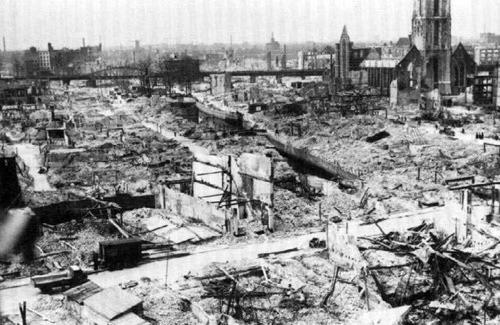
Neeltje Verburg would have been 16 years of age when the Luftwaffe destroyed vast swathes of her home city, Rotterdam. Her family home was one of the buildings destroyed, along with all the family possessions. Happily, amid the ruins, the family survived in a crowded shelter. Their next apartment was destroyed too, again with the family out of harm’s way. Imagine no possessions.
She saw people die, too, as the German invader swept through the city, gunning down brave men who dared to fight back. There was no glory to this war. The Netherlands offered little resistance. In many ways resistance was futile.
With the invasion complete, the Nazis began rounding up apparently disparate groups of people and taking them away, apparently to labour camps. Neeltje was shocked to learn from her father, a humble carpenter called Marinus, that the people were Jews. None of them would ever return to Rotterdam. They were being rounded up, taken away to prisons all around the Netherlands and then to Auschwitz.
Marinus and his wife Anna knew many of the men, women and children who were being matched to the railway station, through the smouldering wreckage caused by the German bombers, loaded onto cattle trucks, taken away to die.
The Verburgs were the lucky ones. They lost their homes, all their possessions and almost starved to death, surviving only on scraps and small birds caught in traps on the verandah of their apartment by Marinus, which were consumed uncooked.
Neeltje, you see, was my mother and she spent many of her formative years in occupied Rotterdam, living in fear of the jackbooted enemy. And one reason they lived in fear was the family name, Verburg. There were Jews bearing that name and Neeltje always wondered if there was a trace of Jewishness in her heritage. If the Nazis concluded they too were Jews, would they get a knock on the door, as so many had in Rotterdam? So far as I know, they never did, but I cannot say that with total conviction because Marinus, who would have been my grandfather, died long before I was born and I was never able to ask him. Neither Neeltje, her brother Jacobus nor Anna ever told me. They all died long ago.
We must never forget the genocide of World War Two. We must never allow holocaust deniers the benefit of the airwaves to repeat their lies. And we must never believe it couldn’t happen here.
All over the world, we see the rise of racism, of xenophobia, of antisemitism, often accompanied by fierce nationalism. That’s how it all starts. We knew how and where it ends.
I often wonder how Neeltje and her family managed to get through the war and all the ugliness that went with it. And I can’t say for sure the damage that was inflicted upon her. Perhaps, that’s why she made hardly any new friends when she came to England, why she rarely spoke to neighbours and strangers alike, why she always locked the front door the second she went inside the house, why once her mother died she never again returned to the Netherlands.
Today’s Holocaust Memorial Day, broadcast tonight on BBC Two, was a deeply and desperately moving occasion and listening to the stories of man’s inhumanity to man reminded me, as if I needed reminding, how close to home it was for my family.
Auschwitz will soon be lost to living memory. For that reason alone, we must ensure future generations are taught to remember. To forget would be the biggest crime of all.
